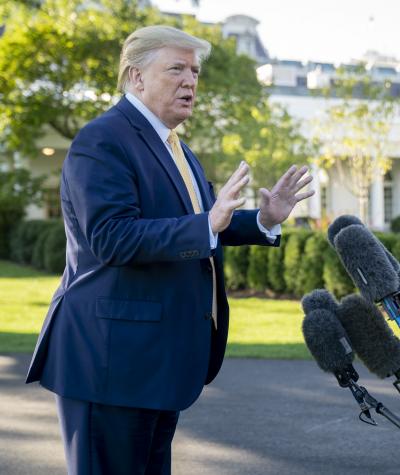President Donald Trump is reportedly scheduled to use the White House South Lawn on Thursday to accept his nomination for the presidency to culminate this week’s Republican National Convention (RNC).
If Trump were to deliver his speech there, he would violate ethics laws and norms meant to keep the work that federal employees do on behalf of the American public separate from their work on partisan political campaigns.
The Hatch Act is the law that tries to ensure federal employees can do their jobs in a nonpartisan manner that is free of coercion. Under this law, most federal employees are barred from using “their official titles or positions while engaged in political activity.” It covers all federal civilian executive branch employees except for the president and the vice president.
The Hatch Act also generally prohibits federal employees from using government property while engaging in political activity—although certain rooms in the White House and the residence of the vice president are considered exempt.
This means that Trump may not personally violate this law if he were to deliver his RNC speech from the South Lawn. However, this decision would blur the line between the work he does as a public servant and a political candidate and establish a dangerous precedent.
In another example of how the line between the public and political at the White House is being eroded, first lady Melania Trump reportedly plans to deliver her RNC speech from the White House Rose Garden.
The law prohibiting political activity on government property still applies for other employees, regardless of the Hatch Act's exception for the president. Any federal employee who helps facilitate the acceptance speech risks violating the Hatch Act. Most importantly, Trump risks violating federal law if he forces White House employees to engage in this political activity.
Most importantly, Trump and the first lady risk violating federal law if they force White House employees to engage in this political activity while on duty.
If Trump delivers his acceptance speech on White House grounds, this decision will violate ethics norms established by former presidents.
For example, to ensure that the line between their work as public servants and political candidates was clear, former presidents George W. Bush and Barack Obama limited political activity to the West Wing and Map Room of the White House. Trump should consider following the example of these former presidents to make the public feel that he is putting their interests ahead of his own.
Public service is a public trust, and it needs to be separate from campaign activity. Trump’s White House staff can and should be aware of the consequences of the further erosion of public trust in the government’s ability to act ethically on behalf of the American people.
